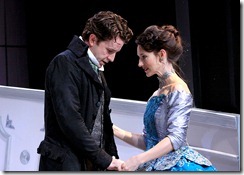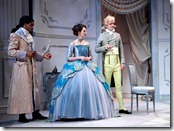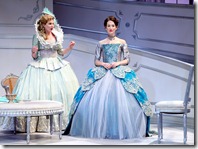When you go (notice I didn't say, ‟if you go”) to see The Misanthrope at the Shakespeare Theatre of New Jersey, take your sunglasses—you'll be that dazzled by the troupe’s opening production of the 2011-2012 season! Of course, I am speaking figuratively, but the luscious costumes and elegant set, not to mention the actors’ delivery of Richard Wilbur’s masterful translation of Molière’s witty dialogue, are nothing short of astounding.
If you look up the word misanthrope in the dictionary, you'll find that it comes from the Greek misanthropos and means a "someone who hates mankind." In Molière's comedy—often considered his finest work—this term refers to the main character, one Alceste, an idealist whose obsession with honesty causes him to reject society's often hypocritical social conventions, wreaking havoc on all spheres of his life.
 Alceste (left) especially abhors people's penchant for treating others with effusive flattery only to denigrate them behind their backs. For this he embarks on a ranting tirade that takes his friend Philinte (right) and the widow he loves, Célimène, to task. Eschewing social hypocrisy, he tells the would-be poet Oronte that the sonnet he's written (and read, seeking Alceste's opinion) is trash, causing such an uproar that Philinte has to step between the two to prevent injury. Alceste's hatred is sweeping; he hates the human lot, so much so that his "spleen is aggravated by the scene of human folly and flattery," causing him to spend the rest of the play in physical distress. He even considers running away to a hermitage to escape society!
Alceste (left) especially abhors people's penchant for treating others with effusive flattery only to denigrate them behind their backs. For this he embarks on a ranting tirade that takes his friend Philinte (right) and the widow he loves, Célimène, to task. Eschewing social hypocrisy, he tells the would-be poet Oronte that the sonnet he's written (and read, seeking Alceste's opinion) is trash, causing such an uproar that Philinte has to step between the two to prevent injury. Alceste's hatred is sweeping; he hates the human lot, so much so that his "spleen is aggravated by the scene of human folly and flattery," causing him to spend the rest of the play in physical distress. He even considers running away to a hermitage to escape society!
 Alceste's devotion to truthfulness is tested by his lady love Célimène (right), who exhibits the very traits he abhors. However, he loves her, believes her charm outweighs her defects and has high hopes that he can cleanse her character of such faults. This conflict between his love and rigid ideals, of course, make Alceste the perfect target of his social circle, as well as the playwright, who, along with a healthy dose of laughter, skewers humankind's shortcomings and transgressions.
Alceste's devotion to truthfulness is tested by his lady love Célimène (right), who exhibits the very traits he abhors. However, he loves her, believes her charm outweighs her defects and has high hopes that he can cleanse her character of such faults. This conflict between his love and rigid ideals, of course, make Alceste the perfect target of his social circle, as well as the playwright, who, along with a healthy dose of laughter, skewers humankind's shortcomings and transgressions.
Once again, Bonnie J. Monte shows her directorial chops, especially when dealing with classical comedy. The action moves along swimmingly, with a cast of ten moving surely and swiftly around the gorgeous set while speaking Wilbur's rhymed verse convincingly and naturally.
The cast she has assembled, many of them making their STNJ début, is certainly up to the task; there isn't a weak performance in the lot. John Patrick Hayden is superb as Alceste, his distaste and dyspepsia evident on his face at all times; he's in pain just watching his fellow human beings behave (at least in his opinion) abominably. His body English, arms crossed, aptly conveys his solemn and complete disapproval. As his foil, Jon Barker's  Philinte is a good-humored observer of mankind, willing to forgive their frailties, and as Oronte, Marcus Dean Fuller is hilarious as he reads his love sonnet, stopping every few words to share commentary and feelings. Roger Casey (left) is perfection as Célimène's conceited suitor Acaste, who admires his face in a silver wine glass and boasts about his sexual prowess; Matt Bradford Sullivan's Clitandre (right) is equally as odious in the honesty department.
Philinte is a good-humored observer of mankind, willing to forgive their frailties, and as Oronte, Marcus Dean Fuller is hilarious as he reads his love sonnet, stopping every few words to share commentary and feelings. Roger Casey (left) is perfection as Célimène's conceited suitor Acaste, who admires his face in a silver wine glass and boasts about his sexual prowess; Matt Bradford Sullivan's Clitandre (right) is equally as odious in the honesty department.
 The object of the men's attention, Célimène, is played with supercilious coquettishness by Elizabeth A. Davis. Possessor of a lovely pair of shoulders and a wasp waist, Davis looks like a porcelain doll, but her tongue stings like a wasp. She deliciously mocks the men who attend her salon with nary a care of the harm she's causing. All this makes her cousin Eliante, played by the luminous Kersti Bryan, so uncomfortable that attempts to lower the critical temperature by coming up with better ways to speak about others who are flawed. She's clearly a better match for Alceste, whom she loves, although he can't see the forest for the trees. But it's Louisa Braden Johnson as the prudish, vindictive Arsinoé (above, left) who almost steals the show. She sails onto the stage like a flagship, plotting mayhem, ready to destroy Alceste's trust of Célimène in the blink of an eye. Her expressive face tells us she's a force to be reckoned with.
The object of the men's attention, Célimène, is played with supercilious coquettishness by Elizabeth A. Davis. Possessor of a lovely pair of shoulders and a wasp waist, Davis looks like a porcelain doll, but her tongue stings like a wasp. She deliciously mocks the men who attend her salon with nary a care of the harm she's causing. All this makes her cousin Eliante, played by the luminous Kersti Bryan, so uncomfortable that attempts to lower the critical temperature by coming up with better ways to speak about others who are flawed. She's clearly a better match for Alceste, whom she loves, although he can't see the forest for the trees. But it's Louisa Braden Johnson as the prudish, vindictive Arsinoé (above, left) who almost steals the show. She sails onto the stage like a flagship, plotting mayhem, ready to destroy Alceste's trust of Célimène in the blink of an eye. Her expressive face tells us she's a force to be reckoned with.
These maneuvers and schemes play out on a stunning set designed by Adam Miecielica, a 17th century French drawing room with a graceful curving stairway, the better to enter and exit with élan! And Paul H. Canada has pulled out all the stops dressing these characters. Célimène gets to wear two luxurious gowns with ruffles, sparkles and giant hoops; Eliante's duds are quieter, as befits her nature. The men are attired in satin and brocade coats with long tails, the better to sweep aside as they sit down! That Alceste is dressed in sober black tells us all we need to know about his character and its contrast to that of his peers. Bonnie J. Monte's use of harpsichord music transports us to 1666, and Tony Galaska's lighting telegraphs the passage of time well.
Opening night at STNJ was 345 years to the day that The Misanthrope premièred in Paris, but the play has lost none of its bite. That's because human nature hasn't changed very much over the almost three and a half centuries. Not a very cheery thought, but laughter is the best antidote to the heartburn caused by our fellow human beings' shortcomings, and The Misanthrope has that in spades.
The Misanthrope will be performed at the F. M. Kirby Theatre on the campus of Drew University, 36 Madison Avenue in Madison through June 26. Performances are Tuesdays, Wednesdays and Sundays at 7:30 PM; Thursdays through Saturdays at 8 PM; and Saturdays and Sundays at 2 PM. For tickets, call the box office at 973.408.5600 or visit online at www.ShakespeareNJ.org.